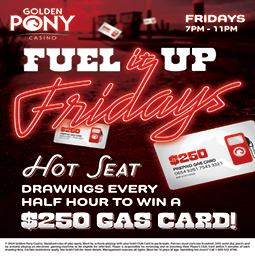Earlier, there were brief details naming early Henryetta theaters Jack Gibson wrote in 1999 shortly before his death, and descriptions of the Blain and Morgan theaters of the 30s and 40s. This will be about experiences as an usher at those two theaters after Dick Klein hired me as the single usher at the Morgan (the Blaine had two) in September 1944 as I started my HHS freshman year.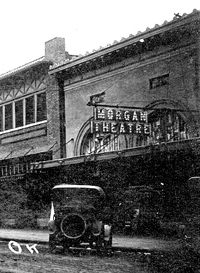
It's fair today to ask why ushers were needed. Movies ran continuously in small towns then. When the feature ended, they immediately ran previews of the coming attractions (in Henryetta it was the next three), a newsreel, a cartoon, and sometimes a one reel short subject about an educational or humorous subject, the best know of which were Pete Smith Specials (humorous), The March of Time (historical), Lowell Thomas Travelogues (well-known or special places), John Nesbitt's Passing Parade (about things leading to significant discoveries or inventions. All were quite interesting.
Then the feature started again. There was no intermission. People ended at all times, began watching whatever, even during the feature, and left when they began seeing things a second time and didn't care to watch anymore a second time. The auditorium was always dark and at least partly full of people when new attendees entered. Since they couldn't see in the dark, ushers kept track of empty seats and, with a flashlight shining on the aisle floor, led the new attendees to them. For this, we were paid 45 cents an hour in 1944 and had to get Social Security cards. For the curious, the Social Security withholding rate then was 1% of the first $3,000 of annual earnings. For me it was just 4 or 5 cents a week, so I sure didn't reach everyone's yearly maximum or $30.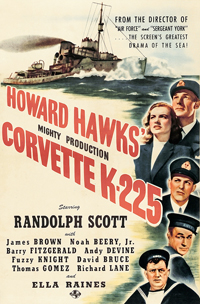 The movie playing at the Morgan when I started ushering was Corvette K-225 about German submarines sinking ships of convoys crossing the Atlantic early in World War II when the U. S. was sending material to England under President Roosevelt's famous “Lend Lease" program before we were officially in the war.
The movie playing at the Morgan when I started ushering was Corvette K-225 about German submarines sinking ships of convoys crossing the Atlantic early in World War II when the U. S. was sending material to England under President Roosevelt's famous “Lend Lease" program before we were officially in the war.
As an usher, I caught glimpses of each movie to the point that I usually saw most of it before it left town.
A few years ago, while surfing TV channels, I paused on one that looked familiar and wondered if it was Corvette K-225.
A few minutes later, I saw K-225 on the side of the ship. It still ended with depth charges from K-225 damaging the submarine so much it surfaced and we could see it sink.
I'd started delivering the Free-Lance in 1941 while in the sixth grade, and still delivered papers after school. Then, I ran home, ate something Mother had fixed for me to eat in a hurry, changed clothes, and beat it to the Morgan by 6:45. I ushered until 9:45 and didn't have much spare time. The first six weeks of school, I made a D in algebra. (That might surprise readers who know me because I have always been a bit of a math whiz.) My father wasn't impressed, and said I couldn't continue that work schedule.
I told Mr. Klein I could only work Friday, Saturday and Sunday nights and Saturday and Sunday matinees. He said that was all he really needed ushers, kept me, and changed all the other ushers to that schedule, and we all started alternating between the Blaine and Morgan. My math grades improved.
Saturday afternoon western or cowboy movies at the Morgan were interesting. The little kids didn't need ushers just someone to keep them in their seats and sufficiently quiet for other to hear. Since they thought anyone older than them had authority that wasn't difficult. Something about the showings of those movies amazed me.
Every Saturday area Indians ("Native Americans") brought their children and sat through the movie and serial several times. 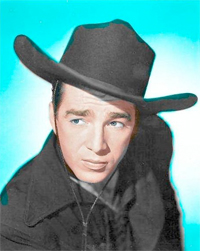
The movies and serials with Roy Rogers, Gene Autry (who actually lived in Henryetta three different times), Wild Bill Elliot, Lash LaRue, Durango Kid, Johnny Mack Brown, etc.
in those days were heavily biased against Indians, referred to them in derogatory terms, and after the whites lost early surprise battles, even after circling their wagons, the Indians always lost the one that counted to excited cheering by the white kids.
I never understood if the Indians thought they might win one, or just what was going through their minds, but they always stayed through several showings. Maybe they liked scenes of their old ways, which weren't nearly as far in the past then. Also, since the movies were primarily for children with short attention spans, the features were always a little less than an hour in length, so it didn't take as long to see them several times as it would today.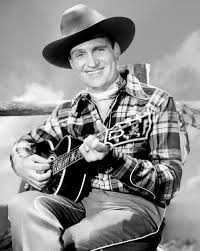 Mr. Klein didn't like for ushers to watch the movie through a curtain beside the door while people were waiting to be seated, but he never really broke us. He was also bothered that popcorn spilled in the lobby was on the floor when it was our job to keep the floor relatively clean, but it usually took a reminder from him for us to even make contact with a broom. We ushers gave him more trouble than the doorman (ticket taker), popcorn girls, or ticket booth girls. He could be stern, but he was more reasonable with us than we deserved. Two of the popcorn girls were Jerry Nell (Hart) Erwin and Berna Dean (Brookey) Agee, both of whom now live in Jenks. I don't recall the names of the older girls in the ticket booths. (Projectionist were adults, and one was a man known by nearly every boy who grew up in Henryetta over a long period Barney Jameson, Henryetta's great Cub Scout leader.
Mr. Klein didn't like for ushers to watch the movie through a curtain beside the door while people were waiting to be seated, but he never really broke us. He was also bothered that popcorn spilled in the lobby was on the floor when it was our job to keep the floor relatively clean, but it usually took a reminder from him for us to even make contact with a broom. We ushers gave him more trouble than the doorman (ticket taker), popcorn girls, or ticket booth girls. He could be stern, but he was more reasonable with us than we deserved. Two of the popcorn girls were Jerry Nell (Hart) Erwin and Berna Dean (Brookey) Agee, both of whom now live in Jenks. I don't recall the names of the older girls in the ticket booths. (Projectionist were adults, and one was a man known by nearly every boy who grew up in Henryetta over a long period Barney Jameson, Henryetta's great Cub Scout leader.
Friday, Saturday and Sunday, January 26, 27, 28, 1945, cowboy star Jimmy Wakely was in town on tour with a sidekick and a starlet.
Mr. Klein had promised me I wouldn't have to work any Friday night when there was a home football or basketball game, and the Hens were playing Ada that Friday for what would probably mean the conference championship. I had to work. People fawned over Wakely and the others, but I didn't.
They offered to give me free personally autographed pictures, but I was so hacked off I wouldn't take them.
The Hens, under their great coach, Marion Anglin, beat Ada and won the conference. (I know the dates Wakely was there from a scrapbook that has dates and scores of Hen sporting events of those days.).
Jerry Nell still remembers that Jimmy Wakely stuck his hand into her popcorn machine at the Morgan to get a handful of popcorn and she hit it with her popcorn scoop because Mr. Klein had told her to not let anyone stick a hand in the popcorn. 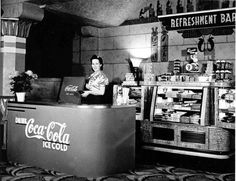
Ushering was often boring, and when thing were slow, we tended to hang around the popcorn girls and gobble handfuls of popcorn they gave us from their scoops. Mr. Klein wasn't amused. A welcome change of duty was to get more corn oil, popcorn, boxes or bags for the popcorn girl from a room behind the projection room. Another usher duty was to check the balcony on occasion to see if any young couples up there were misbehaving I never say any that were, but maybe they saw me coming up the steps in the aisle. Mr. Klein never told me what to do if I found any anyway like tell them tsk, tsk, to start behaving, or just what.
Mr. Klein's young employees with the highest responsibilities were the doormen (ticket takers). When I started, Frankie Daniel was the primary doorman, and his older half-brother, Junior Kelly, had been before him. Then it was Bill (Buddy) Sturdevant of my HHS class. Their most difficult duty was that three times a week, after the ticket booth closed on the last night of each feature run, they had to change the marquee letters at both movies. It was done late at night on tall stepladders, sometimes in very cold or rainy (or both) weather.
Another of their duties on those same nights was dealing with the Grifith Amusement truck delivering films for the next feature to be run and picking up the films from the one that had been run before the current one, which was still being shown. Tickets had an alphabetic code know just by Mr. Klein and the ticket booth girls. When converted to numbers they could compute how many tickets had been sold and how much money the girl had taken in. I wanted to figure it out, so when I briefly relieved the doorman at times, I kept a few stubs to see when one of the letters changed, thinking I'd eventually figure out their order. I got part of it figured out and told that part to Bill Reel, a future brother-in-law who'd come back from WWII and he told me the rest of it! I was so surprised that I didn't ask him where he had learned it he had never worked at a movie. It's been many years now, so I can divulge it. From 0 through 9 it was WESHOALPIX, (we show all pictures). I'll spare explaining how they made sure the popcorn girls turned in all they collected, but if I explained it, readers would find it quite logical.
Tickets had an alphabetic code know just by Mr. Klein and the ticket booth girls. When converted to numbers they could compute how many tickets had been sold and how much money the girl had taken in. I wanted to figure it out, so when I briefly relieved the doorman at times, I kept a few stubs to see when one of the letters changed, thinking I'd eventually figure out their order. I got part of it figured out and told that part to Bill Reel, a future brother-in-law who'd come back from WWII and he told me the rest of it! I was so surprised that I didn't ask him where he had learned it he had never worked at a movie. It's been many years now, so I can divulge it. From 0 through 9 it was WESHOALPIX, (we show all pictures). I'll spare explaining how they made sure the popcorn girls turned in all they collected, but if I explained it, readers would find it quite logical.
As an usher, I was admitted free when I wasn't working and often dropped in to see some or all of what was showing.
Tickets cost 5 cents for under 12 when I was under 12, but later 10 cents. 12 or over was 25 cents, later 30 cents at the Morgan, and 35 cents, later 40 cents at the Blaine. Bags and boxes of popcorn were 5 cents and 10 cents.
They sold candy and gum at the Blaine to the extent available in wartime. They didn't sell drinks, but there were water fountains in both the main and balcony levels. With prices like they were, even after I quit ushering, a boy could take a girl to the Blaine, both have bags of popcorn, and then take her to the Jones & Whitie or S & M (a post-war thing) and both have a cheese sandwich and a coke, all for under $1.50. I was off to college before Henryetta had a drive-in movie.
I can just recall a few who were ushers with me. Sadly, one was Buddy Whiteman who was later killed in Korea his name is on Henryetta's Doughboy plaque. John Seymour was ushering with me when I quit in 1947. A former editor of a discontinued monthly Hen newsletter, Wayne Keith (now deceased) was probably my replacement.
I don't know when I was last in either movie. For the Morgan, it was probably while I was still in HHS. For the Blaine, I suspect it was in the 50s. I don't know when the Morgan closed, but it was long ago. I think it was later a skating rink for some time, but don't know of any other possible uses. In the 70s, the Blaine changed to the "Cine." I was never in the Cine, but a daughter once went there with a cousin when both were in Henryetta with their parents and were bored with the adults. Regarding the Cine, though, I do recall that for some time a man stood on that corner and made strange jerking reactions to every passing car.
After years of being closed, the old Blaine building was demolished in 2008, and a Henryetta landmark passed. In this movie rental and TV age, Henryetta no longer has a movie theater.
More about Henryetta's theaters
- Details
- Written by Earl Goldsmith









